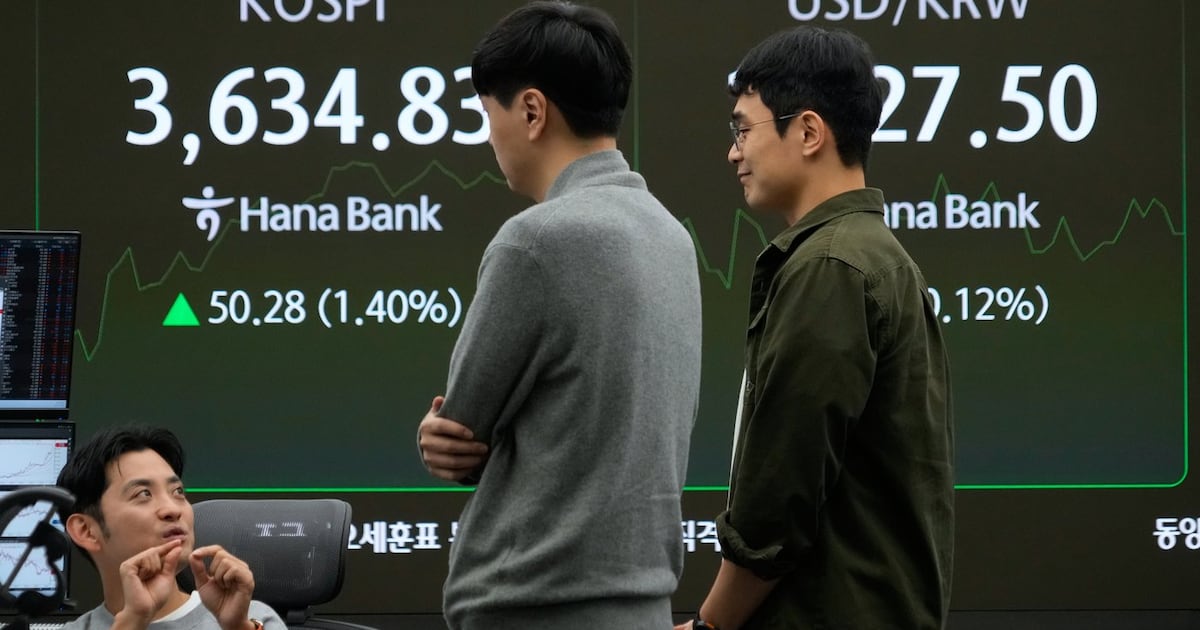Politics
Asian Markets React to Wall Street’s Rally and Trade Tensions

Asian stock markets displayed mixed results on Tuesday following a rally on Wall Street that was influenced by reassurances from U.S. President Donald Trump regarding relations with China. Japan’s benchmark Nikkei 225 declined by 2.6%, closing at 46,847.32 as trading resumed after a national holiday. In Hong Kong, the Hang Seng Index fell 1.8% to 25,431.24, while the Shanghai Composite experienced a slight drop of 0.6% to finish at 3,865.23.
In a social media statement on Sunday, Trump expressed optimism about China, stating, “Don’t worry about China.” He emphasized that Chinese leader Xi Jinping “doesn’t want Depression for his country, and neither do I. The U.S.A. wants to help China, not hurt it!!!” This statement follows Trump’s previous accusations of China being a “moral disgrace” in its dealings with other nations, which contributed to a significant drop in the S&P 500.
Despite the turbulent rhetoric and ongoing issues regarding tariffs and export controls, Trump indicated that he might meet with Xi later this month during a regional summit. In contrast to the declines in Asia, Australia’s S&P/ASX 200 gained nearly 0.2%, closing at 8,899.40, while South Korea’s Kospi fell by 0.6% to 3,561.81.
Wall Street saw a notable rebound on Monday, with the S&P 500 rising by 1.6% to close at 6,654.72, recovering over half of its losses from Friday. The Dow Jones Industrial Average climbed 1.3% to 46,067.68, while the Nasdaq Composite surged by 2.2% to 22,694.61. These fluctuations reflect a market still responding to the volatile statements made by Trump regarding tariffs, which previously shocked investors.
Market analysts, such as those from Mizuho Bank, noted that the recent movements in U.S. equities mirrored the drastic swings seen in April when Trump announced extensive tariffs. The bank described the rebound as a “relief rebound,” suggesting a recovering confidence among investors.
The current market dynamics are also influenced by expectations for potential interest rate cuts by the Federal Reserve, aimed at bolstering the economy. Nevertheless, some critics caution that stock valuations appear high, particularly in the technology sector, where comparisons to the 2000 dot-com bubble are being raised.
In a notable development, Broadcom shares surged by 9.9% after announcing a collaboration with OpenAI to develop custom AI accelerators. This partnership is seen as a significant move in the fast-evolving technology landscape.
As the earnings reporting season approaches, major companies such as JPMorgan Chase, Johnson & Johnson, and United Airlines are set to disclose their financial performance for the summer period. Investors are keenly awaiting this data, as it will provide insight into corporate profitability amidst rising stock prices.
In commodity markets, benchmark U.S. crude oil prices fell by $1.00 to $58.49 per barrel, while Brent crude decreased by $1.07 to $62.25 per barrel. In currency trading, the U.S. dollar weakened to 151.94 Japanese yen from 152.29 yen, and the euro dropped to $1.1554 from $1.1569.
The interplay of geopolitical tensions, market fluctuations, and corporate performance will continue to define the investment landscape as stakeholders navigate the complexities of international trade relations and economic forecasts.
-

 Politics4 weeks ago
Politics4 weeks agoSecwepemc First Nation Seeks Aboriginal Title Over Kamloops Area
-

 World5 months ago
World5 months agoScientists Unearth Ancient Antarctic Ice to Unlock Climate Secrets
-

 Entertainment5 months ago
Entertainment5 months agoTrump and McCormick to Announce $70 Billion Energy Investments
-

 Science5 months ago
Science5 months agoFour Astronauts Return to Earth After International Space Station Mission
-

 Lifestyle5 months ago
Lifestyle5 months agoTransLink Launches Food Truck Program to Boost Revenue in Vancouver
-

 Technology3 months ago
Technology3 months agoApple Notes Enhances Functionality with Markdown Support in macOS 26
-

 Lifestyle3 months ago
Lifestyle3 months agoManitoba’s Burger Champion Shines Again Amid Dining Innovations
-

 Top Stories2 months ago
Top Stories2 months agoUrgent Update: Fatal Crash on Highway 99 Claims Life of Pitt Meadows Man
-

 Politics4 months ago
Politics4 months agoUkrainian Tennis Star Elina Svitolina Faces Death Threats Online
-

 Sports5 months ago
Sports5 months agoSearch Underway for Missing Hunter Amid Hokkaido Bear Emergency
-

 Politics5 months ago
Politics5 months agoCarney Engages First Nations Leaders at Development Law Summit
-

 Technology5 months ago
Technology5 months agoFrosthaven Launches Early Access on July 31, 2025





















